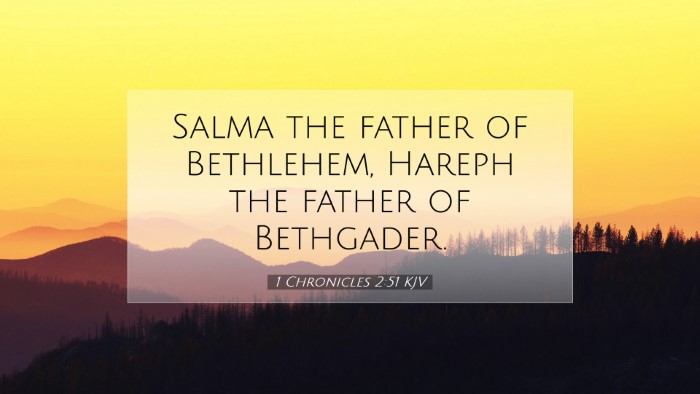Commentary on 1 Chronicles 2:51
Verse Reference: 1 Chronicles 2:51 states: "The sons of Salma: Beth-lehem, and the Netophathites, Ataroth, the house of Joab, and half of the Manahethites, the Zorites." This verse is part of the genealogical record in the Book of Chronicles, which emphasizes the lineage and heritage of the tribes of Israel, particularly focused on Judah.
Historical Context
The genealogies in 1 Chronicles provide crucial insights into the social and religious fabric of ancient Israel. The author of Chronicles is concerned with the restoration of the Israelite identity post-exile and highlights the importance of lineage and territorial allocation as components of this restoration.
Insights from Public Domain Commentaries
Matthew Henry's Commentary
Matthew Henry emphasizes the significance of genealogies as not merely lists of names, but as valuable connections to Israel's history and God's promises. In his view, the inclusion of Salma and the associated cities serves to link the descendants of Israel directly with their heritage and the land bestowed upon them by God.
Henry notes that Salma is associated with important locations like Beth-lehem, highlighting the significance of this town in biblical history, particularly as the birthplace of King David and ultimately, Jesus Christ. The reference to the Netophathites signifies the expanded family networks and the roles these towns held in ancient Israel.
Albert Barnes' Notes on the Bible
Albert Barnes underscores the geographical allocations mentioned in this verse. He points out that cities like Ataroth and Beth-lehem hold strategic and historical significance. Barnes approaches the descendants of Salma by highlighting their societal roles and the responsibilities that come with their lineage, showcasing how these families contributed to the cultural and religious life of Israel.
Furthermore, Barnes notes that the mention of places like the house of Joab signifies an ongoing legacy that traces back to figures associated with strength and valor in Israel's military history. This lineage reflects both a physical and spiritual heritage important for Jewish identity and continuity.
Adam Clarke's Commentary
Adam Clarke provides a theological reflection on the mention of the "sons of Salma." He interprets this genealogical record as a reminder of God’s faithfulness to His covenant people. Clarke discusses the promise made to David and the establishment of his lineage, drawing a redemptive line from Salma's descendants to the greater story of salvation found in Christ.
Clarke also highlights how genealogies serve to affirm the integrity of God's word and the unfolding of divine providence. The towns and districts listed reflect both the tribal inheritances and the prophetic significance of where God chose to work throughout history.
Thematic Analysis
The genealogies indicate various themes prevalent in biblical literature:
- Heritage and Identity: The lineage signifies the importance of heritage among the Israelites, establishing their connection to the land and God’s promises.
- God’s Faithfulness: The chronicler meticulously preserves records to affirm that God remains faithful to His covenants with His people, ensuring their legacy is recognized.
- Community and Belonging: These families and their specified locations reflect the communal aspect of the Israelites, emphasizing the social structure and shared responsibilities among the tribes.
- Expectancy of the Messiah: The mention of key figures foreshadows the coming Messiah, being rooted in a lineage that ultimately leads to Jesus Christ—a theme crucial for Christian theology.
Application for Modern Readers
This genealogical verse, though it may initially appear as a simple record, carries profound implications for believers today:
- Understanding Our Roots: Just as the Israelites celebrated their heritage, Christians are invited to reflect on their spiritual lineage and the faith traditions that shape their beliefs.
- Recognizing God's Faithfulness: The continuity of God's promises encourages believers to trust in His faithfulness across generations, reinforcing their faith amid uncertainties.
- Value of Community: Understanding the roles of the families in these genealogies can lead to an appreciation for community within the church and the importance of supporting and nurturing each other.
- Anticipation of God's Work: Just as the people of Israel looked to God's promises, modern believers are called to remain expectant for God's leading and the fulfillment of His promises in their lives.
Conclusion
1 Chronicles 2:51 may seem like a mere detail within the broader narrative but serves as a significant reminder of God’s unfolding plan through generations. The insights from Matthew Henry, Albert Barnes, and Adam Clarke invite us to appreciate the profound depth of these records and the historical, cultural, and spiritual truths that emerge from them. As we engage with such texts, we are reminded of our connection to the past and our hope in the future God's promises assure us of.


